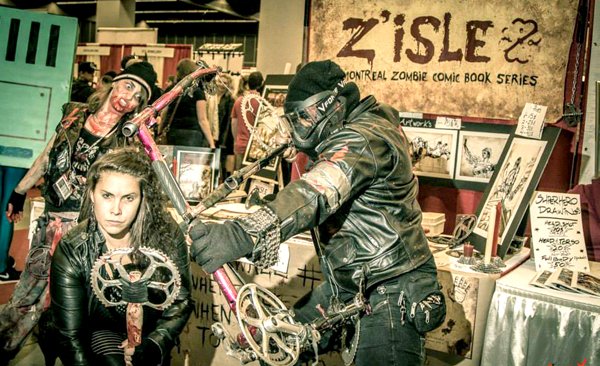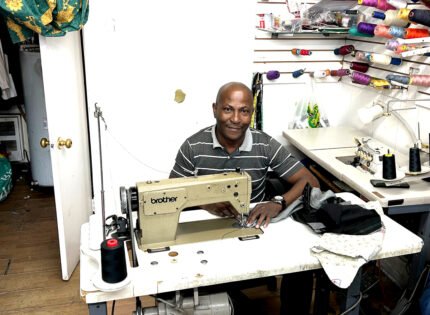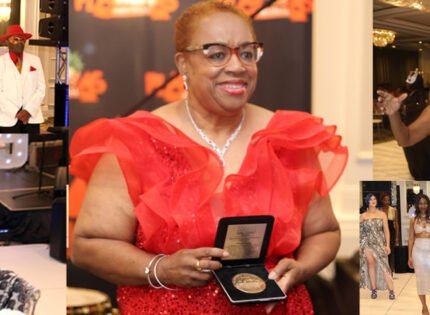Attempting to build on Z’Isle the comic book and video game
Egbert Gaye
Seven years after the zombies came, Montreal is less than a shadow of its former self. And language is hardly an issue for the few thousand of us who survived the wrath of the flesh-eating, blood sucking feeders, instead it’s all about staving off the marauding bands of scavengers and trying to rebuild the once thriving metropolis.
With the soul of the city eaten away, the place is now called Z’Isle, (pronounce it zile).
Without order, infrastructure or governance, robust individualism prevails and self-preservation is the call of the day for the roof-bound communities, charged with the  responsibility of salvaging what’s left of humanity.
responsibility of salvaging what’s left of humanity.
This is the world created by Lateef Martin, a young Montrealer who since his childhood has been trying to keep pace with his hyper-creative mind.
Now in his late 30s, Lateef, with his well-established skills as an illustrator and storyteller, has positioned himself to make a foray into the uncharted territory that is independent comic book publishing and video game development.
The vehicle he is using to get there is Z’Isle, a comic book and video game that is set in Montreal seven years after the city was overrun by a zombie apocalypse.
“What sets us apart with these projects is the fact that the story is based here in Montreal,” says Lateef, who was born here and attended Argyle Academy in Verdun before moving on to Dawson College.
“We want Z’Isle to become Canada’s zombie mythology, the same way that other epic zombie stories are associated with other cities, such as Ghostbusters is to New York and The Walking Dead to Atlanta.”
With that in mind, Lateef is relentless in his efforts to develop the multi-platform project and have the story entrenched in the lexicon of comic book readers and gamers around the world.
To make it happen he is constantly in search of new ideas, new partners and funders, and that takes him on a seemingly endless trek across Canada and the United States attending comic book and video game conventions, conferences, workshops and competitions.
So in the less than two years since Lateef brought Z’Isle into the world of deferred reality, he already has two moderately successful issues of the comic book, earning a readership of about 1,200 readers so far, and he and his team are readying themselves for a third edition that is expected to put about another 3,000 copies on the streets.
And as they do so, he is working simultaneously at the developmental stage of the video game, which he says has the potential to present Z’Isle on another platform to millions of gamers around the world.
He recently received a $133,000 grant from the Canadian Media Fund to develop the game and has put together a team of some of Montreal’s best creative people to make this phase of the project happen.
“At this stage, I’m (cautiously) excited about the prospects for Z’Isle, because of how far we have taken the project in a relatively short period of time, but I also know how much more work there’s still to be done,” he told the CONTACT in a recent sit-down. “So the challenge is to keep moving forward and staying focused.”
Over the past few weeks he and two of his creative people – a game designer and a programmer – have been working around the clock at his cramped home office in the Plateau to complete the developmental stage of the video game. After which, he will go back to the funders with a slice of the finished product, to start the process of looking for a production grant to bring the game to market.
Getting to this point has been a journey of near hits and misses for this young Montrealer who has been made restless by the creative and entrepreneurial force that has been driving him since his childhood.
He took his first shot at creating a business out of his creations in the 1990s, around the time he was in the Creative Arts department at Dawson College. He and his brother tried to find financiers for another comic book project under their Dreadlock Edutainment label.
“It almost happened because we had one investor, but we were let down by the Mathieu DaCosta Fund (which was a $1 million community-based operation in place to assist small and medium- sized businesses.)”
Lateef says he became despondent after that and walked away from his drawing and formed a 17-piece band playing techno, rock, hip hop and soft heavy metal music at venues across Montreal.
He also had a beat-box duo thing going on with his brother. But he never walked too far away from his art and worked as a freelancer throughout the early 2000s.
In 2007, he was encouraged by a friend to return to Dawson College in the Illustration and Creative Design department and rekindled his determination towards making a living out of his art; projects such as Fire Masters and Z’Isle started to take root.
In 2013, he joined a local game-developing company, Execution Lab, and became one of five developers working on free-to-play video games. However, it wasn’t the direction he wanted to go, not when he had two major projects of his own he wanted to bring to production. So in late 2013 he approached the Canadian Media Fund for funding for the Fire-Master video game, but was refused. So last year he used the recommendations that came with the refusal to convince them to fund Z’Isle.
Lateef makes a point saying that to get to where he is today has been a mega learning experience and is always available to tell the hordes of young Montrealers who want to get into the business what it took for him to sidestep some hurdles.
“First thing I tell them is that they have to take art seriously and learn the fundamentals well before they venture out to all kinds of weird style,” he says. “I also tell them that they shouldn’t over-estimate their skills because so many of them think that they’re better than they actually are.”
Lateef says also that because so many of them are introverts, they should go out, meet people and network with others in the business.”
In making his way forward, Lateef says he is indebted to many people who have helped and supported him along the way, not the least of which is his girlfriend Isabelle Duguay, his co-writer, co-creator and art director of the project.
Along the way, a few accolades have been heaped upon him. Just this year he won top prize at the Montreal Independent Games Festival held at Dawson College, and he easily outstripped the other contestants at the recent Pitch the Dream competitions, which was part of the AFPRO for emerging entrepreneurs and professionals, coordinated by the UIBE Network.
He values each commendation as part and parcel of his ultimate goal to put his art in the hands of millions… to entertain and to provoke thought.
Today, he has $133,000 in hand, a team of talented individuals, and a free-flow of ideas in his head to make it happen.















